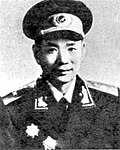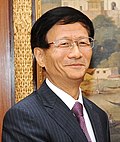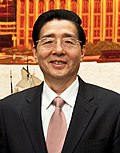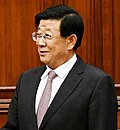| No. | Portrait | Name (Birth–Death) | Term of office | Important offices held during tenure | Premier | Ref. |
|---|
| Took office | Left office | Term |
|---|
| Minister of Public Security of the Central People's Government |
|---|
| 1 | | Luo Ruiqing
罗瑞卿
(1906–1978) | 19 October 1949 | 28 September 1954 | 4 years, 344 days | Deputy Director of the Political and Legal Committee of the State Council
Commander of the People's Liberation Army Public Security Force
Political Commissar of the People's Liberation Army Public Security Force | Zhou Enlai | [5] |
|---|
| Minister of Public Security of the People's Republic of China |
|---|
| 1 | | Luo Ruiqing
罗瑞卿
(1906–1978) | 28 September 1954 | 17 September 1959 | 4 years, 354 days | Deputy Director of the Political and Legal Committee of the State Council
Commander of the People's Liberation Army Public Security Force
Political Commissar of the People's Liberation Army Public Security Force Vice Premier of the State Council | Zhou Enlai | [5] |
|---|
| 2 |  | Xie Fuzhi
谢富治
(1909–1972) | 17 September 1959 | 22 June 1970 | 10 years, 278 days | Commander of the People's Liberation Army Public Security Force
Political Commissar of the People's Liberation Army Public Security Force
Vice Premier of the State Council
Secretary of the CCP Secretariat
Director of the Beijing Revolutionary Committee
Political Commissar of the Beijing Military Region
Political Commissar of the PLA Beijing Garrison | [6] |
|---|
| Director of the Revolutionary Committee of the Ministry of Public Security |
|---|
| 3 |  | Li Zhen
李震
(1914–1973) | 22 June 1970 | 21 October 1973 | 3 years, 121 days | Head of the Party Core Group of the Ministry of Public Security | Zhou Enlai | [7] |
|---|
Vacant
21 October 1973 – 17 January 1975 |
| Minister of Public Security of the People's Republic of China |
|---|
| 4 |  | Hua Guofeng
华国锋
(1921–2008) | 17 March 1975 | 5 March 1978 | 2 years, 353 days | Premier of the State Council
Chairman of the Central Military Commission | Zhou Enlai
↓
Hua Guofeng | [8] |
|---|
| 5 |  | Zhao Cangbi
赵苍璧
(1916–1993) | 5 March 1978 | 21 June 1983 | 5 years, 108 days | Secretary of the Party Leadership Group of the Ministry of Public Security
Member of the Central Political and Legal Affairs Commission
Political Commissar of the People's Armed Police | Hua Guofeng
↓
Zhao Ziyang | [9] |
|---|
| 6 |  | Liu Fuzhi
刘复之
(1917–2013) | 21 June 1983 | 6 September 1985 | 2 years, 77 days | Secretary of the Party Leadership Group of the Ministry of Public Security
Political Commissar of the People's Armed Police
Deputy Secretary of the Central Political and Legal Affairs Commission | Zhao Ziyang | [10] |
|---|
| 7 |  | Ruan Chongwu
阮崇武
(born 1933) | 6 September 1985 | 11 April 1987 | 1 year, 217 days | Secretary of the Party Leadership Group of the Ministry of Public Security
Political Commissar of the People's Armed Police | [11] |
|---|
| 8 |  | Wang Fang
王芳
(1920–2009) | 11 April 1987 | 28 December 1990 | 3 years, 261 days | Secretary of the Party Leadership Group of the Ministry of Public Security
Political Commissar of the People's Armed Police
State Councillor
Director of the National Narcotics Control Commission | Zhao Ziyang
↓
Li Peng | [12] |
|---|
| 9 |  | Tao Siju
陶驷驹
(1935–2016) | 28 December 1990 | 19 March 1998 | 7 years, 81 days | Secretary of the Party Leadership Group of the Ministry of Public Security
Political Commissar of the People's Armed Police | Li Peng | [13] |
|---|
| 10 | | Jia Chunwang
贾春旺
(born 1938) | 19 March 1998 | 28 December 2002 | 4 years, 284 days | Secretary of the Party Leadership Group of the Ministry of Public Security
Political Commissar of the People's Armed Police | Zhu Rongji | [14] |
|---|
| 11 |  | Zhou Yongkang
周永康
(born 1942) | 28 December 2002 | 28 October 2007 | 4 years, 304 days | Secretary of the Party Leadership Group of the Ministry of Public Security
Political Commissar of the People's Armed Police
State Councillor
Secretary of the CCP Secretariat
Deputy Secretary of the Central Political and Legal Affairs Commission | Zhu Rongji
↓
Wen Jiabao | [15] |
|---|
| 12 |  | Meng Jianzhu
孟建柱
(born 1947) | 28 October 2007 | 28 December 2012 | 5 years, 61 days | Secretary of the Party Leadership Group of the Ministry of Public Security
Political Commissar of the People's Armed Police
State Councillor
Secretary of the Central Political and Legal Affairs Commission | Wen Jiabao | [16] |
|---|
| 13 |  | Guo Shengkun
郭声琨
(born 1954) | 28 December 2012 | 4 November 2017 | 4 years, 311 days | Secretary of the Party Leadership Group of the Ministry of Public Security
Political Commissar of the People's Armed Police
State Councillor
Secretary of the CCP Secretariat
Deputy Secretary of the Central Political and Legal Affairs Commission | Wen Jiabao
↓
Li Keqiang | [17] |
|---|
| 14 |  | Zhao Kezhi
赵克志
(born 1953) | 4 November 2017 | 24 June 2022 | 5 years, 219 days | Secretary of the Party Leadership Group of the Ministry of Public Security
State Councillor
Deputy Secretary of the Central Political and Legal Affairs Commission | Li Keqiang | [18] |
|---|
| 15 |  | Wang Xiaohong
王小洪
(born 1957) | 24 June 2022 | Incumbent | 3 years, 139 days | Secretary of the Party Leadership Group of the Ministry of Public Security
Political Commissar of the People's Armed Police
State Councillor
Deputy Secretary of the Central Political and Legal Affairs Commission | Li Keqiang
↓
Li Qiang | [19] |
|---|















